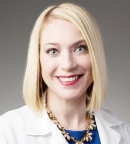
Stephanie Graff, MD
Diversity, inclusion, and gender equality were prevalent themes for 2019 that ran throughout the ASCO Annual Meeting. From the first year that featured free onsite child care for attendees, to a session on “Establishing a Mutually Respectful Environment in the Workplace,” as well as a Plenary Session that highlighted health policy as a strategy to decrease disparities in care, it is exciting to see our field leading these important discussions. This approach is a necessity if we are going to create systemic change on a national scale.
What’s in a Name? Introductions of Mutual Respect
Among the highlights at the Annual Meeting was a clinical science symposium moderated by Leora Horn, MD, and David Graham, MD, FASCO, on workplace inequities. In the session, Narjust Duma, MD, presented an analysis1 that surveyed the 2017 and 2018 ASCO Annual Meeting video archives and assessed whether speakers were introduced using a professional address (Dr. Last Name or Dr. Full Name).
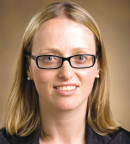
Leora Horn, MD
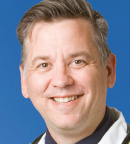
David Graham, MD, FASCO
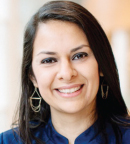
Narjust Duma, MD
The results showed that women were introduced with a professional address 61% of the time, with male speakers receiving a professional address 81% of the time, a statistically significant difference. Female speakers were introduced by their first name a surprising 17% of the time. When correcting the data set for academic rank, geography, or degree, the inequity persisted. Tatiana Prowell, MD, took the microphone during the panel Q&A to commit to help remove this bias at the 2020 ASCO Annual Meeting, where she will be serving as the Education Committee Chair.
During the discussion, Christina Chapman, MD, shared previously published research showing that both women and black individuals perform worse on tests when primed first about gender or race. One can imagine the hours spent preparing for a presentation at a national meeting the size and scale of the ASCO Annual Meeting—reviewing the literature, finalizing slide content, sharing content with peers or other panelists for comment and review. That does not factor in the years of scientific research that produced the abstract, or the years of work that led to the invitation to speak. Nor does it consider the years of medical school, residency, and -fellowship.
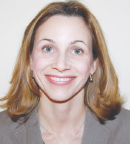
Tatiana Prowell, MD,
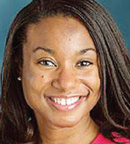
Christina Chapman, MD
Given the work it takes to prepare to stand at that podium, isn’t it a shame to diminish it with a casual introduction laced with a stereotyping microaggression? If the point of a speaker introduction is to introduce the speaker to a largely unknown audience, thereby setting the stage for the speaker as a credible, trusted expert, shouldn’t it be a moment of solemn professionalism?
During this year’s Annual Meeting, I was introduced at the podium as “Dr. Stephanie Graff,” both times by male introducers. I serve on ASCO committees with both of the doctors who introduced me. They know me well (both are my senior), and both call me “Stephanie” off the stage. Yet they were able to stand on stage and introduce me professionally as the mentors, friends, allies, and
Given the work it takes to prepare to stand at that podium, isn’t it a shame to diminish it with a casual introduction laced with a stereotyping microaggression?— Stephanie Graff, MD
Tweet this quote
the #HeForShes I know them to be. In their role as session chairs, they created the opportunity for me to be on stage in the first place. One of my two sessions included all female panelists. In the second session, I was the only female speaker, but two other women were invited to author the education book chapter with us.
These moments tell me that change is possible, and together, we can dramatically shift statistics in a positive way. Looking forward to the 2020 Annual Meeting, I see this foundation of mutual respect as another way to bring to life the theme of “Unite and Conquer: Accelerating Progress Together.”
Standing Up for the Language of Professional Equality
Dr. Chapman also spoke a hard truth: We know there are disparities in medicine for women and minorities. Discrimination and harassment persist in our profession. We know this definitively. We know this scientifically. What we need to do is accept it as fact. By accepting the current state, we can turn our research focus to developing systems of change. We can establish broader policies to reduce bias and improve reporting. We can look to the 32% of practicing oncologists who are women2 and create an opportunity for them to be authors, editors, reviewers, speakers, presenters, panelists, discussants, and leaders.
When we introduce our professional colleagues—and not just at the podium, but in all professional settings—let’s use the language of professional equality: Doctor.— Stephanie Graff, MD
Tweet this quote
We have already seen this play out on the national stage when, on the heels of the 2019 ASCO Annual Meeting, Francis Collins, MD, PhD, Director of the National Institutes of Health, announced that he would no longer accept invitations to speak on “manels,” or panels of all male speakers. This stand highlights a key way for male physicians to serve as allies and advocates for their female colleagues. Other examples highlighted by Drs. Chapman and Duma during the panel discussion included the simple first step of listening to the conversation or naming discriminatory behaviors and language when you see them in action.
As we implement practice-changing scientific advances after the ASCO Annual Meeting, I hope we will all pause to consider Dr. Duma’s work as similarly practice-changing. When we introduce our professional colleagues—and not just at the podium, but in all professional settings—let’s use the language of professional equality: Doctor. ■
Dr. Graff is Director of the Breast Program at the Sarah Cannon Cancer Institute HCA Midwest Health and Associate Director of the Breast Cancer Research Program at the Sarah Cannon Research Institute.
Disclaimer: This commentary represents the views of the author and may not necessarily reflect the views of ASCO or The ASCO Post.
DISCLOSURE: Dr. Graff has served on the speakers bureau for OncLive and has received institutional research funding from Boehringer Ingelheim, Celldex, Genentech, GRAIL, Immunomedics, Innocrin Pharma, Lilly, Merus NV, Novartis, Odonate Therapeutics, and TapImmune.
REFERENCES
1. Duma N, Durani U, Woods CB, et al: Evaluating unconscious bias: Speaker introductions at an international oncology conference. 2019 ASCO Annual Meeting. Abstract 10503. Presented June 3, 2019.
2. American Society of Clinical Oncology: The state of cancer care in America, 2017: A report by the American Society of Clinical Oncology. J Oncol Pract 13:e353-e394, 2017.

